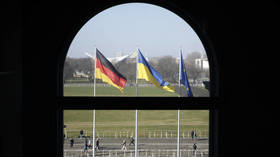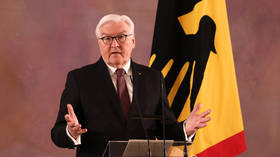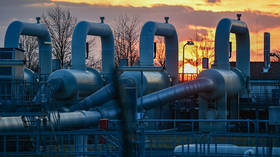Ukraine explains decision to shun German president

Ukraine will welcome any foreign “high-ranking official” as long as they come with “specific offers related to either economic or military support,” an aide to President Volodymyr Zelensky has told the Die Welt newspaper, explaining Kiev’s decision to turn down a visit by the German President Frank-Walter Steinmeier.
“Any visits that take place nowadays end up with a [specific] result,” the deputy head of the Ukrainian president’s administration, Igor Zhovkva, told the German outlet, adding that Kiev would very much like to see “any high-ranking politicians” coming to Ukraine “bringing” such “results” with them. He then went on to say that, in Germany’s case, it could put an “embargo on [Russian] oil” or provide “guarantees” for Ukraine’s accession to the EU or “heavy equipment” supplies.
The presidential aide also hinted that Berlin may not be as steadfast in its support for Ukraine as Kiev would like. All nations that are “friendly” to Ukraine “demonstrate a similar attitude to Russia and the Russian leadership,” Zhovkva said, adding that they do not “make any exceptions for the energy sector, banking sector or certain members of [the Russian] political establishment.”
The Kiev official has also claimed that “most Germans, up to 70% [of the population], want to see Ukraine in the EU right now” but Berlin is still “hesitant to support Ukraine’s accelerated accession” to the bloc. At the same time, he added that Kiev would welcome German Chancellor Olaf Scholz at any time.
President Frank-Walter Steinmeier was about to visit Kiev together with his counterparts from Poland, Estonia, Latvia and Lithuania on Wednesday. However, he said on Tuesday that he “apparently was not wanted” in the Ukrainian capital. Berlin has not provided an official explanation for the snub so far.
German tabloid Bild reported earlier that the president was not welcome in Kiev because of his supposed ties to Russia. In Ukraine, the politician is still associated with the 2016 attempt to implement the Minsk agreements in the Donbass, known as the “Steinmeier formula.” He also supported the Nord Stream 2 gas pipeline linking Germany and Russia, which has now been canceled by Berlin.
Under the Steinmeier formula, the two disputed regions of Donetsk and Lugansk – which Moscow now recognizes as independent states – were supposed to hold elections under Ukrainian laws and OSCE oversight. They were then to get special self-governing status within Ukraine, returning the control of their borders with Russia to Kiev. Kiev, Moscow, the two regions and the OSCE signed that formula in October 2019. Ukrainian President Volodymyr Zelensky sought to implement it but faced opposition from nationalist circles, including the “Azov” regiment, so it ultimately went nowhere.














